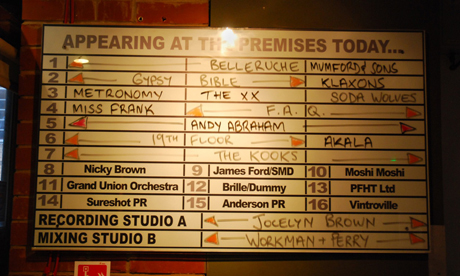The Premises recording studio celebrates 25 years

What do Nina Simone and Girls Aloud have in common apart from genre-defying, heartfelt vocals? Both have sung at Hackney Road’s The Premises Studios. This year, east London’s busiest music studio is celebrating its 25th anniversary, going from strength to strength despite the malaise of the music industry. The booking board at The Premises’ reception reads like the Who’s Who of British indie – The XX, Mumford & Sons and Hot Chip are all recent visitors. The Kooks are on a lock-out in the rehearsal room and The Klaxons have their instruments stored in a cage in the back.
The transformation of The Premises into a musical institution began in 1996 when Viv Broughton took over a low-profile jazz studio near Haggerston Park. It was a rudimentary recording space where musicians had to haul their equipment up and down the stairs, a Premises manager told me.
With the help of European Union’s regeneration funding and private investment, Viv and the Premises’ Managing Director Julia Craik bought derelict buildings next door, creating the Premises as it is today. A series of innovate ventures has since followed, including the installation of large solar panels and the opening of a popular Turkish café downstairs. The Premises are now teaming up with a local beekeeper to put some hives on the roof, an idea that’s been prompted by the rapid collapse of wild bee colonies.
Such ideas are “a mix of ethical decision[s] and business investment,” says Julia. “It gives us a business edge.” Recording in a solar-powered studio appeals to carbon-conscious musicians, helping The Premises compete with bigger studios.
Community engagement is another aim of the business. The Premises is home to a registered music education charity working with local young people. It runs the country’s most successful New Deal for Musicians programme, a government scheme helping unemployed young musicians get into the music industry. “We are looking into new ways of offering internship schemes, [but] at the moment everything is in flux because of the recession,” said Julia.
The Premises’ biggest challenge is keeping up with constant technological advances in music recording. “[We] have to upgrade all the time; you get through drum kit after drum kit… Overheads are very high. Profit margins aren’t that good,” she said.
The possibly terminal decline in the sales of recorded music is making this task even harder. “Many recording studios have closed and many more are cutting budgets, [yet] our business has benefitted from this, as record labels just don’t have the budgets to allow musicians to spend months booked into – for example, Air or Abbey Road studios – and now choose more realistically priced studios.”
The falling cost of home recording is another concern, and although Julia agrees that many bands can now make a record in their bedroom, they still need the space to get together and “bang on the instruments.”
Professional bands make up a growing share of the Premises’ business, but the studios are open to anyone looking to record or rehearse material. Those who need a helping hand can try out courses such as gospel vocal training, salsa piano and jazz vocal recording. You never know, you just might meet your muse.

“Low profile”?, “Rudimentary”? Steady on!It wasn’t that bad! That aside it’s come on a pace and is now SOTA and green since Viv took up the reins! I still have the congas I lent Nina’s percussionist when they rehearsed at the Prems and will never sell them.
Julia’s done an amazing job as have all the staff there and although the initiatives, space, staff and gear is amazing it’s the extra special vibe that gives this institution it’s ultimate USP…BBx